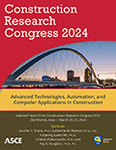Deep Reinforcement Learning-Based Optimization for Crew Allocation in Modular Building Prefabrication
Publication: Construction Research Congress 2024
ABSTRACT
Off-site construction has been steadily gaining popularity due to significant potentials and benefits in repeatability and standardization of processes. Since most of the construction activities are manually executed by labor force, it decreases productivity and manufacturing capacity. To this end, this study proposes a Deep Reinforcement Learning (DRL)-based decision-making tool for optimizing labor allocation to each ongoing activity with the aim to improve production pipelines by reducing delays and cost overruns. The study includes a framework that models the interdependencies between workstations and dependence on productivity of available labor and material resources to determine the optimal number of workers at various workstations, thereby reducing the make-span. The model utilizes the Q-learning algorithm along with real-time data on labor and material availability, current progress status, and deadlines of modules in the queue for predicting best possible action regarding distribution of workers to different workstations in the facility. The developed framework is elucidated through a case study to demonstrate the capabilities of the proposed model in automated handling and management of resources. The proposed framework contributes to the body of knowledge by (1) considering all renewable and non-renewable resources involved, (2) accounting for uncertainties, and (3) providing critical information required for well-informed decision-making in real time.
Get full access to this article
View all available purchase options and get full access to this chapter.
REFERENCES
Banerjee, D., Syal, M., and Hastak, M. (2006). Material flow-based facility layout analysis of a manufactured housing production plant, Journal of Architectural Engineering, 12 (4) 196–206.
Blismas, N., and Wakefield, R. (2009). Drivers, constraints and the future of offsite manufacture in Australia, Construction Innovation, 9 (1), 72–83.
Bris, P., and Bendito, F. (2019). Impact of Japanese post-disaster temporary housing areas’(THAs) design on mental and social health. International Journal of Environmental Research and Public Health, 16(23), 4757.
Yu, H., Al-Hussein, M., Al-Jibouri, S., and Telyas, A. (2013). Lean transformation in a modular building company: A case for implementation. Journal of Management in Engineering, 29(1), 103–111.
Dagkakis, G., Rotondo, A., and Heavey, C. (2019). Embedding optimization with deterministic discrete event simulation for assignment of cross-trained operators: an assembly line case study, Computers & Operations Research, 111, 99–115.
Faghihi, V., Nejat, A., Reinschmidt, K. F., and Kang, J. H. (2015). Automation in construction scheduling: a review of the literature. The International Journal of Advanced Manufacturing Technology, 81, 1845–1856.
Ghannad, P., Lee, Y. C., and Choi, J. O. (2020). Feasibility and implications of the modular construction approach for rapid post-disaster recovery. International Journal of Industrialized Construction, 1(1), 64–75.
Hyun, H., Yoon, I., Lee, H. S., Park, M., and Lee, J. (2021). Multi-objective optimization for modular unit production lines focusing on crew allocation and production performance. Automation in Construction, 125.
Lee, J., and Hyun, H. (2018). Multiple modular building construction project scheduling using genetic algorithms, Journal of Construction Engineering and Management, 145 (1).
Lee, J., Park, M., Lee, H.-S., Kim, T., Kim, S., and Hyun, H. (2017). Workflow dependency approach for modular building construction manufacturing process using dependency structure matrix (DSM), KSCE Journal of Civil Engineering, 21 (5),1525–1535.
Pezzella, F., Morganti, G., and Ciaschetti, G. (2008). A genetic algorithm for the flexible job-shop scheduling problem, Computers & Operations Research, 35 (10), 3202–3212.
Xie, H., Chowdhury, M. M., Issa, R. R., and Shi, W. (2007). Simulation of dynamic energy consumption in modular construction manufacturing processes, Journal of Architectural Engineering, 24 (1).
Information & Authors
Information
Published In
History
Published online: Mar 18, 2024
ASCE Technical Topics:
- Business management
- Case studies
- Computer models
- Construction engineering
- Construction industry
- Construction management
- Decision making
- Employment
- Engineering fundamentals
- Labor
- Methodology (by type)
- Models (by type)
- Modular structures
- Offsite construction
- Personnel management
- Practice and Profession
- Productivity
- Research methods (by type)
- Structural engineering
- Structures (by type)
Authors
Metrics & Citations
Metrics
Citations
Download citation
If you have the appropriate software installed, you can download article citation data to the citation manager of your choice. Simply select your manager software from the list below and click Download.
